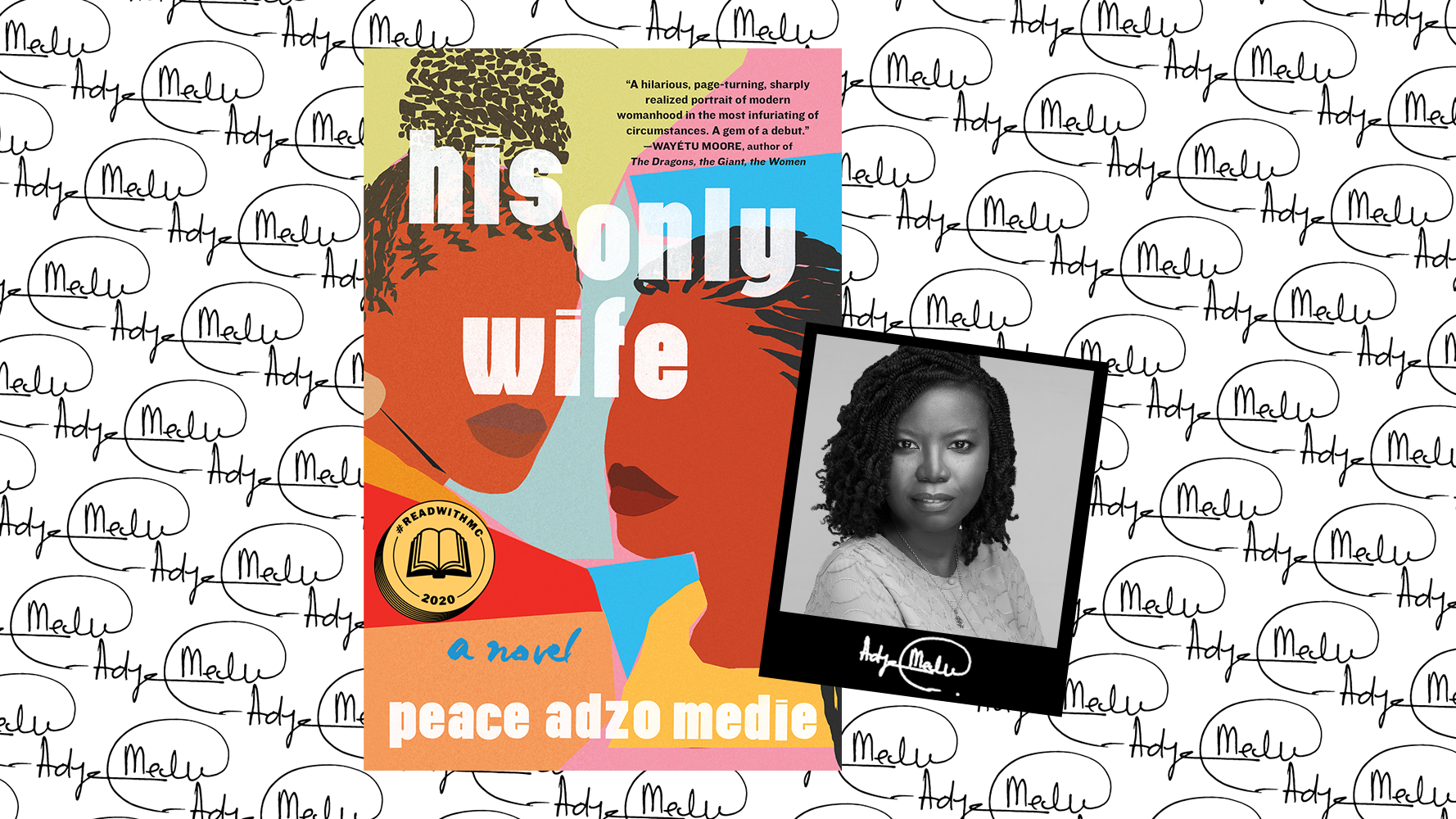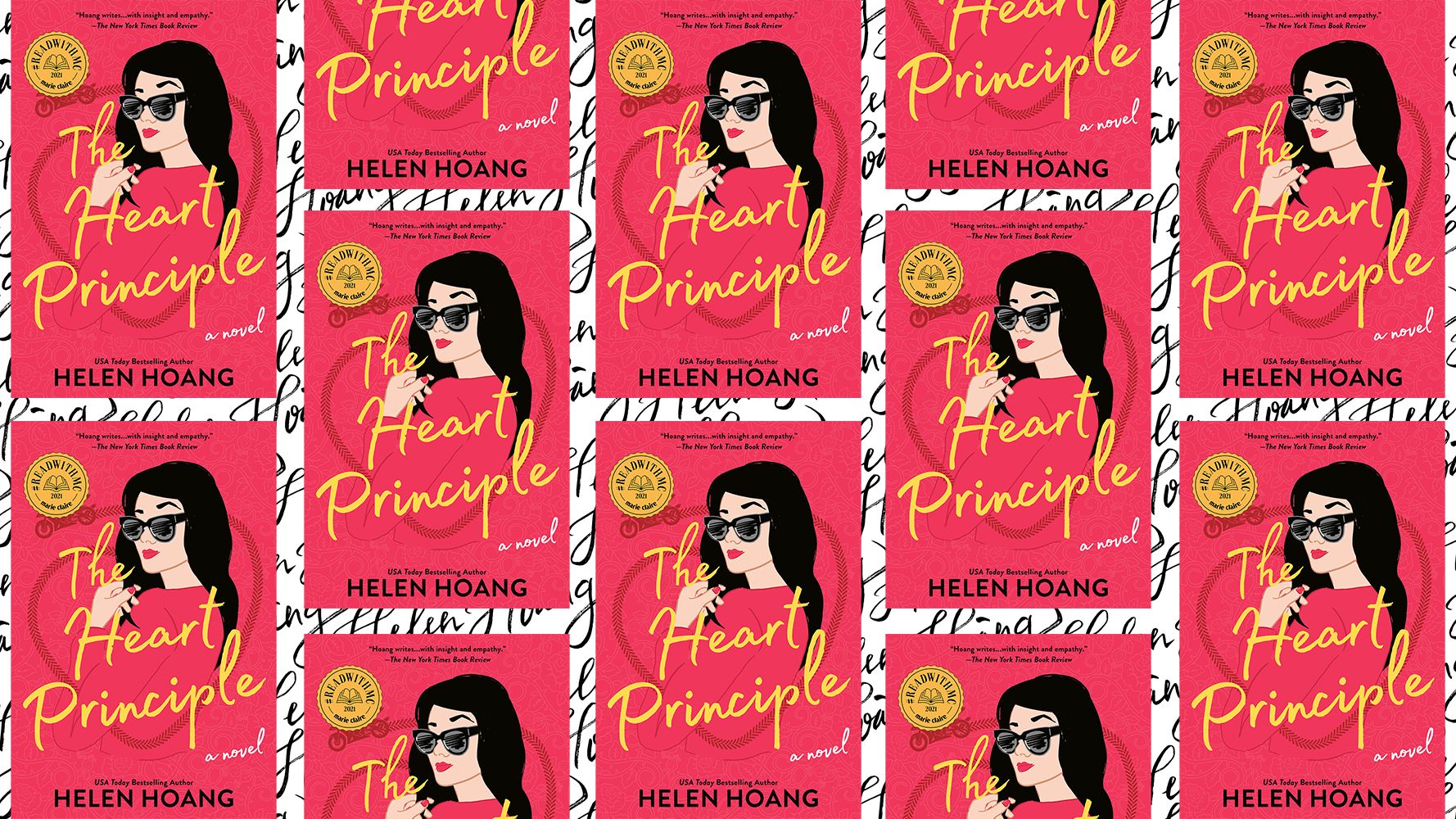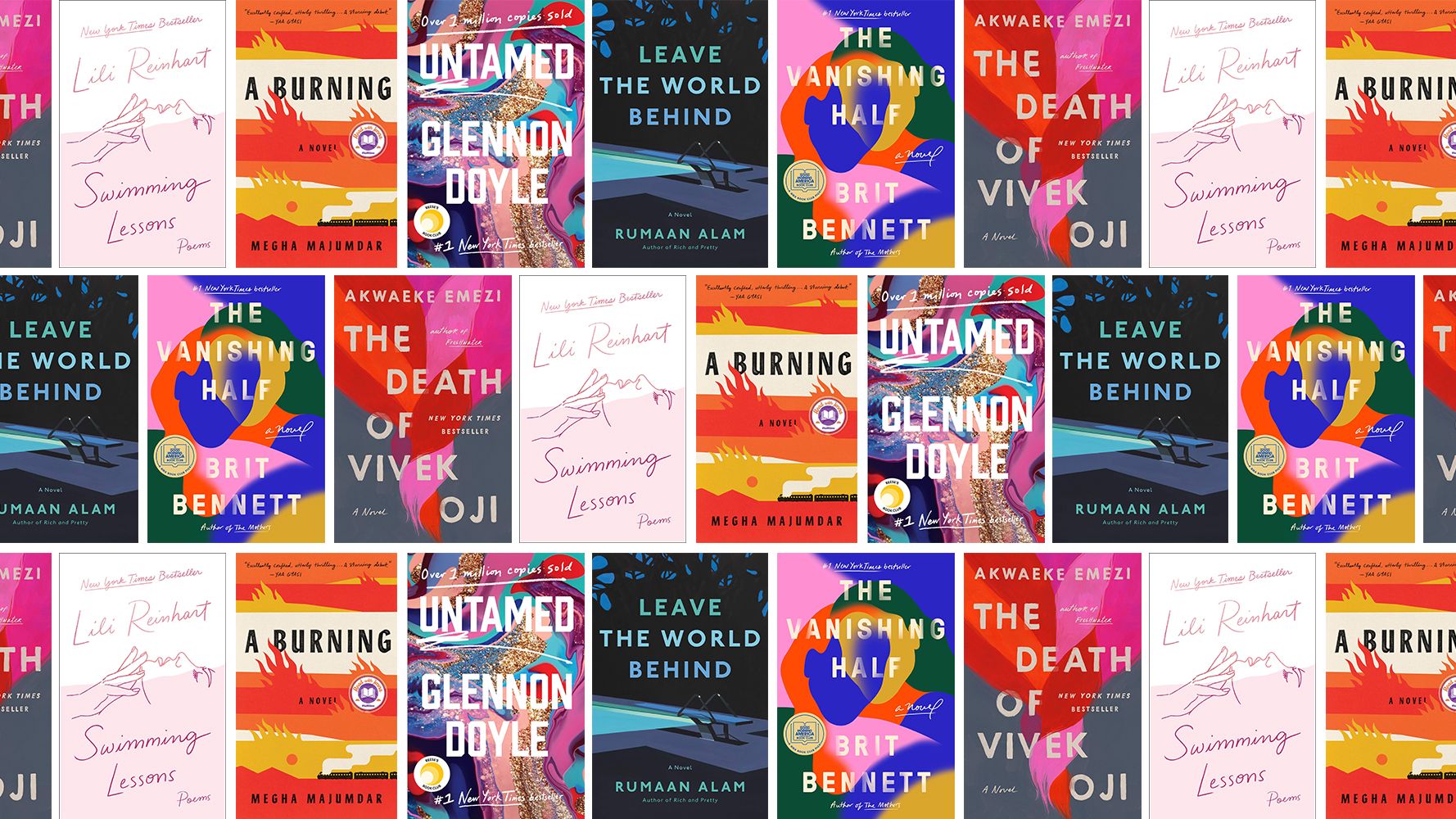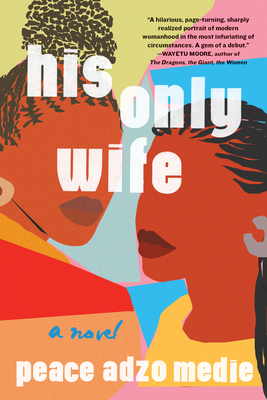'His Only Wife' Is Marie Claire's October Book Club Pick
Read an excerpt from Peace Adzo Medie's novel, here, then dive in with us throughout the month.


Welcome to #ReadWithMC—Marie Claire's virtual book club. It's nice to have you! In October, we're reading Peace Adzo Medie's debut novel, His Only Wife, a book about a young seamstress in Ghana who's convinced to marry a wealthy man she doesn't know, uprooting her life and becoming someone she doesn't recognize. Read an excerpt from the novel, below, then find out how to participate in our virtual book club here. (You really don't have to leave your couch!)
Elikem married me in absentia; he did not come to our wedding. The ceremony was held on the third Saturday in January in the rectangular courtyard of my Uncle Pious’s house, which was bordered by two-roomed apartments and a wooden gate that opened onto a busy footpath. Our relatives, stirring with equal measures of happiness, but for different reasons, sat opposite one another on rented plastic chairs that were neatly arranged in rows that filled the courtyard. The partly walled kitchen had been scrubbed and cleared of the cast-iron coal pots, on which my uncle’s wives prepared the evening meal, and of the enamel basins that they used for washing and storing dishes. My uncle’s sitting room chairs, upholstered with a carpet-like fabric and polished so that the chocolate-brown wooden frames glistened, were also brought outdoors and comprised the front row where the elders of each family would sit.
Before the guests arrived, my Uncle Pious, who was my t gã, my late father’s oldest brother, deposited his bulk into a chair, beaming, as though he was the one to be married. He was flanked by his two younger brothers, my uncles Bright and Excellent. T gã Pious’s chiseled face, with bushy eyebrows that grew in every direction, did not match his soft body. His smile resembled a grimace. That morning as he sat in his itchy armchair, his black-and-white kente cloth had come loose, slid down his arm, and pooled around the elastic waistband of his culottes so that his fleshy chest was on display. He didn’t bother to pull the cloth back up. Other uncles and older male cousins, about fifteen of them, shoulders high with unearned authority, settled into three rows of plastic chairs behind T gã Pious. They all longed to be in his position so much so that they had begun to imitate him. They copied his guffaw, which was usually accompanied by several thigh slaps and followed by a loud, drawn out, woooohoooo; they snapped their fingers like him when they wanted attention, and when that didn’t work, they whistled. Today, they were ready to support him in executing his head-of-family duties, as though he would need help in stretching out his hands to receive the bottles of schnapps, cash-stuffed envelopes, and gaily wrapped parcels that my soon-to-be in-laws would present. The youngest and most inconsequential among the cousins would, of course, be displaced by my older aunties when the ceremony began.
But for now, most of the women were in my grand-aunt’s house, which sat opposite T gã Pious’s. They were bustling around in her roofless kitchen, preparing the food that would be served after the ceremony. When I had visited earlier, there had been okro soup, reddened with palm oil, bubbling in a cavernous pot on a clay stove. My father’s sister, Sylvia, who lived in Togo and only visited on special occasions, shoved several twigs into the clay stove to turn up the heat and then scooted away with a yelp when sparks began to fly. The sparks still dotted the air when someone broke out in song, which the others picked up and sang, repeating verses until the soup began to boil over into the wood fire, the smoke sending everyone into a coughing fit. Despite the smoke, the air in the kitchen was thick with the aroma of spices and herbs that tickled my nose. The women shooed me out of the kitchen when I began to sneeze repeatedly, and I reluctantly returned to T gã Pious’s house where the others were also hard at work.
A few of them meandered among the chairs, their hands heavy with branded handkerchiefs, bottle openers, mugs, and picture frames that had been stuffed into small, multicolored gift bags and were being lined up on a table draped in a white tablecloth. These were gifts intended as souvenirs for the wedding guests. My mother had selected Nancy, my ferocious cousin who had just completed secondary school, to oversee the souvenirs table. She could be trusted to drive away those guests who would tuck their gift bags into the folds of their cloths and come back for second, third, or even fourth helpings. It was also especially good that she could control the children who were always underfoot, no matter how many times they were shooed away.
I watched Nancy through the black window bars of T gã Pious’s sitting room, her face a frown of concentration, as she carefully counted each colorful bag that was placed on the table. I’d never seen her so focused on anything, but then, this was the first time that something of this magnitude had happened to us. Mawusi, one of T gã Pious’s daughters and the cousin to whom I was closest, strode out of the bedroom and began dabbing my face. My eyelids fluttered closed as the white handkerchief, which she wielded like a surgical tool, migrated from the bridge of my nose to my forehead. It was immediately replaced by a sponge from a compact that she had fished out of a small rhinestone-encrusted clutch tucked into her armpit.
“It’s enough,” I said in protest as she lightly brushed my checks. This was the fifth time that she had touched up my makeup in the last hour. I couldn’t have been sweating that much; I wasn’t nervous, not then anyway. I was mostly weary. Since my mother told me that I would be marrying Eli, I had felt as though I was balancing our two families like a basin of water, which was full to the brim, on my head. It wasn’t easy being the key to other people’s happiness, their victory, and their vindication. I desperately wanted the wedding to be over because then I would have done my part. Or, rather, I would have begun to do my part.
Get exclusive access to fashion and beauty trends, hot-off-the-press celebrity news, and more.
“Ah, it’s okay, you’re only adding to my stress with all this makeup,” I protested when Mawusi’s hand and the makeup sponge continued to hover in my face.
“Stress? Haven’t I told you to relax? There’s nothing to be stressed about. You should be happy and smiling.” She was glaring at a small pimple on my chin as she spoke.
“You make everything sound so simple. I barely know the man. And what if things don’t work out, what if this marriage doesn’t make him leave the woman, what if it doesn’t bring him closer to his family, what if I let everyone down? His family? My mother? This whole town? I couldn’t sleep last night just thinking about this,” I said in a whisper, because we weren’t alone.
“Everybody says he’s a good man so there’s no need to be afraid.”
I sighed heavily, not caring that she was standing so close that I was exhaling into her face. My cousin was obviously too overcome with excitement to have a proper conversation. In fact, it was as if she wasn’t even listening to me. As soon as she freed me, I lowered myself onto a coffee table to give some relief to my feet, which were crammed into cream, pointed-toe pencil heels.
“Is it clean?” I heard my mother call out from across the room. She was overseeing the stacking of plates onto the dining table. The plates would be used to serve Eli’s mother, his uncles, his siblings, and their special guests from Accra. They would eat plates of fried rice, grilled chicken and pork, and vegetable salad, inside the house at the table, unlike the others, who would eat their akple and goat-meat okro soup outside, where they had watched the ceremony. The caterer would soon return with the chafing dishes; my mother had placed the fried rice order herself, reluctant to leave this task to my aunties who were in charge of the food.
I sprang to my feet as she bustled over to us in her floor-length, fitted skirt.
“Give me the handkerchief,” she snapped at Mawusi, who was still shadowing me and now appeared to be stricken with guilt; she had failed in her duties as my attendant. My mother folded the handkerchief to hide the side that was covered with brown face powder and began carefully dabbing at my lace-covered backside. She couldn’t risk any of the sequins coming loose.
“Afin, let me do it,” Mawusi offered, but my mother swatted her hand away.
Mawusi flinched and looked at me with a mix of exasperation and pain. “Don’t mind her,” I mouthed. Three months before, I wouldn’t have been afraid to give sound to my words but now I dared not. This wedding was so important and my mother so anxious that all go according to plan that I expected her to throw a fit at any moment.
She wanted everything to work out perfectly: for Eli to be satisfied with me; for Eli’s mother, Aunty Faustina Ganyo, to get back her son; for us to enjoy the status that would surely come with being tied, by marriage, to the Ganyos. Aunty had done so much for us. When my father died ten years before, in 2004, we were forced out of the government bungalow and most of our valuables seized by those who claimed, without showing any proof, that my father owed them money. It was Aunty who offered us one of her properties, a two-bedroom house with an indoor bathroom and kitchen. Meanwhile, T gã Pious had sat back, his gut resting on his thighs, lamenting the lack of rooms in our family’s compound and the tenants’ refusal to move out after their leases expired. It was also Aunty who gave my mother a job as a saleswoman in her flour distribution depot, without my mother even asking. And the woman wasn’t even a relative or a friend! We, of course, knew of her like everyone else in Ho. We knew that she wasn’t the only rich businesswoman in town but was the most generous and never hesitated to help those in need. We were used to seeing her white Pajero drive down the main road, the driver in the front with her nestled near the door in the back. I had attended the Christmas parties she threw every year for the town’s children. The ones—initially held on the lawn of Parks and Gardens but later moved to the stadium when the regional minister timidly lamented the bald patches that our feet left behind in the grass—where you could drink as many cups of chilled leha, the sugary corn drink, as you wanted, and each child was sent home with a small transparent plastic bag of doughnuts, chips, and toffees. And my mother was a member of the Women’s Guild, of which Aunty had been president for so many years that no one remembered her predecessor or cared to schedule new elections.
“God bless her!” my mother would say as she admired a sack of maize or some other gift that Aunty’s driver had dropped off. Half of our morning devotion was spent entrusting Aunty into God’s hands and praying for her cup to overflow. When I was younger I would imagine, with great concern, Aunty neck-deep in supernatural water as a hovering golden chalice rained even more water down on her head.
“Father, let your blessings flow, overwhelm her with your love, overtake her with your grace,” my mother would plead, a tremor in her voice.
But my mother had never imagined that she, afin, Afi’s mother, would ever be able to repay Aunty’s kindness, until Aunty proposed marriage between our families. So now she carefully smoothed the sleeves of my shimmery boat-neck top, and directed Mawusi to hold up the slippery, cream fabric of my slit so that the hemline wouldn’t drag on the linoleum.
Excerpted from His Only Wife by Peace Adzo Medie. Copyright © 2020. Reprinted with permission of the publisher, Algonquin Books.
If audio is more your thing, you can listen to the excerpt, below, and read the rest of the book on Audible.
RELATED STORIES


Rachel Epstein is a writer, editor, and content strategist based in New York City. Most recently, she was the Managing Editor at Coveteur, where she oversaw the site’s day-to-day editorial operations. Previously, she was an editor at Marie Claire, where she wrote and edited culture, politics, and lifestyle stories ranging from op-eds to profiles to ambitious packages. She also launched and managed the site’s virtual book club, #ReadWithMC. Offline, she’s likely watching a Heat game or finding a new coffee shop.

